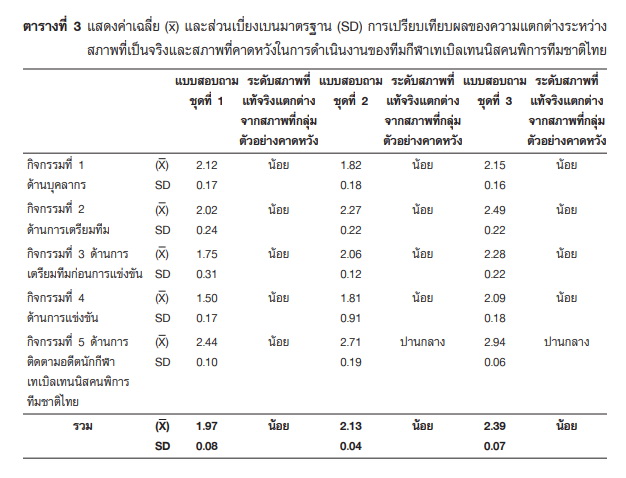A COMPARATIVE STUDY OF ACTUAL AND EXPECTED EXPERIENCES OF THE MANAGEMENT OF THAI PARA TABLE TENNIS TEAM
Main Article Content
Abstract
Purpose To compare between actual and expected experiences of the management of Thai para table tennis team based on value-chain theory.
Methods Fifty-seven informants participated in this study. The population was divided into three groups: 7 members of board of directors and/or key sponsors, 20 national coaches and supporting staff, and 30 former or current Thailand’s para table tennis players. A set of questionnaires and a semi-structured interview were used to collect the data from each group. The face validity and the reliability for the first group were 1.00 and 0.93, while those of the second group were 0.96 and 0.84, and those of the third group were 0.95 and 0.88. The results obtained from the three sets of questionnaires were statistically analyzed in terms of frequency, percentage, means, and standard deviation.
Results There was only little discrepancy between the actual and expected experiences perceived among the three groups. The mean values of discrepancy between the actual and expected outcomes for the three groups were 1.97, 2.13, and 2.39, respectively. Further analysis suggested that the greatest difference perceived among the three groups was follow-up issues where the second and the third group perceived a moderate discrepancy between the actual and expected outcomes, but the first group felt small discrepancy between the actual and expected outcomes
Conclusion The findings revealed that the three groups had similar opinions towards the actual and expected perceptions. Only one aspect which was the follow-up of the former players had moderate difference from the reality.
Article Details
References
Barnard, C. I. (1938). The functions of the executive. Cambridge, MA: Harvard University Press.
Chinthanet, T. (1999). Example of application of sports science in training athletes such as swimming athletes. Sports science and technology substance.
Faengsakhen, M. (1993). Strategies for sports trainers. Mahasarakham: Mahasarakham Teachers College, Faculty of Education, Department of Physical Education.
Gultawatvichai, T. (1995). Advance Teachnique and Skill Table Tennis. Bangkok: Chulalongkorn University.
Katesing, W. (1995). Principles of creating and analyzing research instruments. Bangkok: Thai Wattana Phanit.
Lumputtha, P. (2017). Developing Managerial Guideline of Cycling for the Excellence of Sisaket Provincial Sports Association. Master’s Thesis, Burapha University.
Nuchamyong, E. (2003). Conditions and problems of preparing a team of disabled athletes to participate in the 8th phase of the Games. Master’s Thesis, Srinakharinwirot University.
Porter, M.E. (1985). Competitive Advantage: Creating and Sustaining Superior Performance. Free Press, New York.
Saereerat, S. (1998). Marketing Management. Bangkok: Pathana Suksa.
Sukree, L. (1980). Research report on Indicator study Thai sports development: sports development for the masses. Bangkok: Printing of Chulalongkorn University.
Taveesat, O. (2013). A Study of Necessary Factors and Processes Leading to Sustained Sport Achievement at the Thailand University Game: A Case Study of Table Tennis. Master’s Thesis, Chulalongkorn University.


